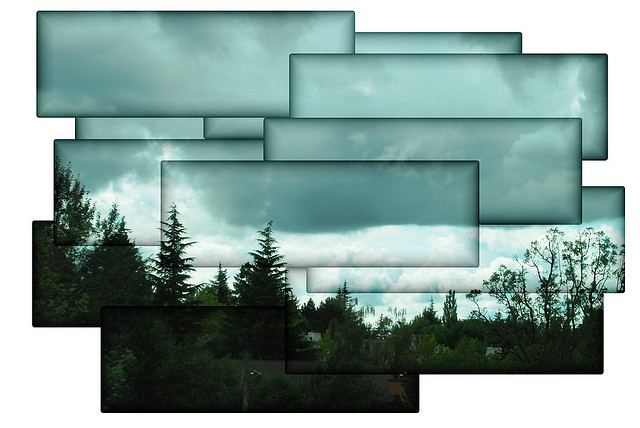Today is the first day since we’ve been in Portland that the sky was completely overcast. Our bedroom was a pale blue-gray when we woke, and I found the color to be incredibly peaceful and calming. I have a feeling that there are plenty of Portlanders who do not share my adoration for this hue, but rather see it as a portend of a wet and possibly depressing time to come. I’d like to think that I won’t succumb to the Pacific Northwest Blues, but there’s no way of telling.
A few months back, on a short visit to Portland actually, I was in conversation with a few friends. We were making small talk about our lives, all of us expecting and preparing for upcoming transitions. My friends were moving out of state and we were still reeling from becoming the parents of a high school grad. At one point in the conversation I said to them,
“You know – I’m just not ok. I don’t think I have been for a while.”
I explained to them that for a good while I’d been unable to stay on top of things. My spiritual practice had fallen by the wayside. I was having a difficult time approaching the morning. I was short-tempered, easily embittered, and just not myself.
“I think you might be depressed,” my friend told me.
I didn’t really know what that meant. I had some context for depression, but only as it related to other people. I didn’t know what depression felt like from the inside-out. Or if I did, I didn’t know how to identify it as such. My friends suggested that I go visit a doctor and get an opinion, and after a few days of considering it I took their advice.
Making the choice to take an anti-depressant, which I’ve been doing now for a little over a month, brought up a number of unexpected biases I’d been holding onto. Turns out I’ve always thought that anti-depressnats were copouts. Certainly as someone who’s been a relatively religious and spiritually-minded person for most of his life I can see how dealing head-on with the more difficult aspects of life can lead to the development of great character and fortitude. Pills shortcut valuable learning, I believed. Pills are a pass to avoid the natural discomfort of living.
I now think that is bullshit.
About two weeks into taking the anti-depressant I started to notice that I was no longer agitated over every little thing. I was able to let things roll of my back in a way that I’m not sure I’ve ever been able to do. The people around me took notice as well. It seems that people have been coping with my depression without my realizing it. They were waiting for me to get upset, to spiral into worry over the smallest thing, and for the first time in years I wasn’t doing that.
I think I’ve been depressed for a really long time and I had no idea.
Even now I find it challenging to use the word “depression,” because when I write it down it doesn’t carry the weight it should. It seems like a passing emotion, as though it can be easily fixed with a piece of cinnamon toast or a peppy pop-song. But depression, as I understand it now, is more like — well — the clouds in Portland. It changes the way everything is lit. Every aspect of your life is colored differently. But unlike these clouds, which are impossible not to notice or identify, the cloud of depression is invisible. There is no cloud to point to: there is just a different quality of light.
To say that taking an anti-depressant is like the clouds parting and the sun returning might be a bit of stretch, but only by a little. It’s more like the cloud has dissipated. The world around me doesn’t look all technicolor or surreal. It just looks like I remember it looking before I was upset all the time. It’s as simple as that.
My spiritual practice hasn’t magically returned. I still get angry about things from time to time. I still feel sadness, and I don’t feel numb. I just don’t feel like I’m walking through an emotional haze. And I’m grateful for that. I can’t even begin to tell you how grateful I am. I don’t know when this depression started, or how much of my religious busyness has been an attempt to cull the feeling. But I can start to examine that now in a way that seemed impossible while walking through the cloud.
One of my prejudices about anti-depressants was informed by this notion that a spiritual person shouldn’t need drugs. They should be able to meditate their way into a better state or pray their way into happiness. I believed that to take an anti-depressant was to copout on the really difficult work of a spiritual life. I think I was incorrect about that, but I’m still finding the language around why I was incorrect.
What do you think? Do you have personal experiences with depression, and did you find that taking an anti-depressant led to a better state of mental health? Was it hard for you to reconcile taking the pills with the tenets of your spiritual practice, or did you find a way to rationalize your choice?
How did you make your way through the cloud?

Leave a Reply